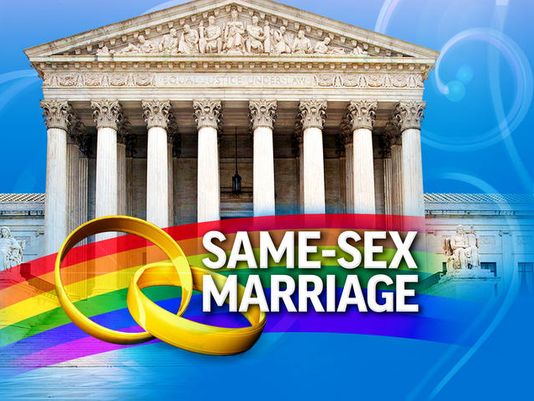On Tuesday, April 28, arguments were finally heard in the case of Obergefell v. Hodges, a case that was actually a consolidation of four different lawsuits filed in four different states. The first, Obergefell v. Hodges, was filed in Ohio after a same-sex couple petitioned the courts to have a same-sex spouse listed on the death certificate of the other spouse (who was dying of ALS). The other, now consolidated cases, in order of filing date, are Tanco v. Haslam (filed in Tennessee), DeBoer v. Snyder (filed in Michigan), and Bourke v. Beshear (filed in Kentucky). These four states  are all in the same appellate court jurisidiction, one where challenges to the constitutionality of same-sex marriages were ignored and bans on those marriages were upheld.
are all in the same appellate court jurisidiction, one where challenges to the constitutionality of same-sex marriages were ignored and bans on those marriages were upheld.
Oral arguments began first thing on Tuesday morning, and sought to answer two specific questions: is it discriminatory for states to block gay couples who are currently unwed from entering into a marriage contract in their home state, and should states have to recognize same-sex marriages that are legal elsewhere but not performed in their specific jurisdiction?
The pro-gay marriage side presented the argument that the Supreme Court, in many decisions prior to this one, has affirmed that marriage is a fundamental right and that all Americans should have access to it. The pro-equality lawyers argued that this is the time to state explicitly that everyone should be allowed to access a right like marriage equally.
The argument against same-sex marriage was essentially put before the court thusly: states have always had the authority and responsibility to not only define marriage, but to regulate it. They go on to say that this is a fairly new debate in society, and that the people should be allowed to decide their feelings about this issue and not the courts.
One particularly contentious comment made by the side against marriage equality had a number of “swing judges” either accepting its veracity or doubting it. Justice Anthony Kennedy referred to marriage as an institution that occurs “between one man and one woman,” and that such a definition has been around for “millennia.” Chief Justice John Roberts noted to the pro-marriage equality side that once the definition of marriage is “changed” to include same-sex couples, there would be “no more debate,” as it would be a decision that could not be undone. Justice Samuel Alito disagreed with Justice Kennedy regarding his interpretation of one-man-one-woman marriage as the definition “for millennia,” remarking that Ancient Greece long condoned homosexuality, that some ancient societies could very well have allowed same-sex unions, and the key question: could the current definition of marriage be trusted due to the very real and very documentable discrimination and hatred gay people have suffered throughout history.
Normally conservative justices such as Samuel Alito and John Roberts seemed very open to the idea of possibly legalizing same-sex marriage nationwide, or at the very least were very sensitive to the idea of gay couples being discriminated against (an idea that Justice Alito articulated during arguments: he believed the question before the Court isn’t necessarily ‘Should same-sex couples be allowed to get married?’ but more ‘Who gets to decide?’). Chief Justice Roberts was concerned that the current bans against same-sex marriage (still standing in 13 states) would amount to “straightforward sexual discrimination,” and if they do, perhaps the Court should do away with them. Even Justice Antonin Scalia, who has made his personal opinions against same-sex marriage well-known, gave indications that at the very least, he would most likely be against states voiding existing marriages, and alluded to disapproving of states which refuse to acknowledge same-sex marriages performed in other states.
The liberal wing of the court, led by Justice Ruth Bader Ginsburg and echoed by similarly liberal Justices Elena Kagan and Sonia Sotomayor, attacked the anti-equality side very quickly, especially when the Assistant Attorney General of Michigan attempted to argue that states have a vested interest in regulating marriage because they want to promote procreation and “binding children to biological parents.” Immediately the Justices brought up same-sex couples who adopt children, and that such an argument against these parents is harmful. Justice Ginsburg also brought up couples who marry in their later years: should a 70-year-old couple be allowed to marry even though the woman can no longer conceive a child? All of the trusted liberal justices, including Justice Stephen Breyer, had no argument when Justice Ginsburg noted that the definition of marriage had already been changed quite a few times in our country’s history, especially in terms of the rights women have in these unions.
The only justice who made minimal comment during the arguments was Justice Clarence Thomas. Like Antonin Scalia, it is no surprise that Clarence Thomas, a devout Catholic, strongly opposes same-sex marriage. It is also common for Justice Thomas to refuse comment during the argument stage of many cases, like he did on Tuesday.
A number of outcomes can happen now that the Supreme Court prepares to decide this case. Most likely the decision will be released in the last week of June, the same time period as many contentious past court cases. It looks like three options are on the table, all with varying degrees of probability. One probable choice is that the previous appellate decisions in Michigan, Ohio, Kentucky and Tennessee will be overturned, immediately allowing for same-sex marriages in those states as well as recognition of same-sex marriages in other states. The court may even go a step further and find that all thirteen of the current same-sex marriage bans are unconstitutional, leading to an immediate legalization of marriage equality throughout the country. The court can also let the appellate court rulings stand, effectively creating a country of have-and-have-not, where 37 states have marriage equality and 13 do not. This is particularly unlikely since it flies in the face of a number of affirmative appellate rulings that find banning same-sex marriage discriminatory, and it also contradicts the Court’s lack of action last October, which effectively brought marriage equality to nearly a dozen states. Whatever the decision is, at the bare minimum it looks like it will be favorable to the gay and lesbian community.
 “This isn’t about one case or one individual state. It’s really about the entire nation and what it means to be a free people and to have civil rights,” Todd Delmay said as he and his husband, Jeffrey, traveled to Washington to be a part of that historic day at the Supreme Court. The Delmays were one of the couples who sued for marriage rights with the help of Equality Florida last year, and they were the second same-sex couple to marry in Florida, by Judge Sarah Zabel, on January 5.
“This isn’t about one case or one individual state. It’s really about the entire nation and what it means to be a free people and to have civil rights,” Todd Delmay said as he and his husband, Jeffrey, traveled to Washington to be a part of that historic day at the Supreme Court. The Delmays were one of the couples who sued for marriage rights with the help of Equality Florida last year, and they were the second same-sex couple to marry in Florida, by Judge Sarah Zabel, on January 5.
“Since the freedom to marry has come to Florida, we have heard from thousands of couples about the positive impact marriage has had on their lives – that they’ve never felt more connected and committed, and are finally able to take care of their families legally and financially,” said Nadine Smith, Executive Director of Equality Florida. “America is ready for a nationwide ruling on the freedom to marry.”
“I can’t imagine the same court that struck down the Defense of Marriage Act is going to do anything but follow the same line of reasoning,” Howard Simon, Executive Director of the ACLU of Florida, told the Tampa Bay Times when asked what he thinks the Court’s decision will be.
Like Mr. Simon, we are very hopeful that the Supreme Court will do the just, fair and right thing by recognizing that marriage is a right for all consenting adults in this country, and that sexual orientation should not play a role in who gets to marry whom.
Hotspots Media Group is committed to providing coverage on hot button issues that affect our lives, such as marriage equality, with a distinct focus on how these issues affect Floridians like you and I. You can find updates on this issue over the next few weeks on our website, hotspots.lgbt; on the Hotspots Facebook and Twitter pages (facebook.com/hotspotsmag; twitter.com/hotspotsfl); and on Mark’s List (markslist.lgbt).
















